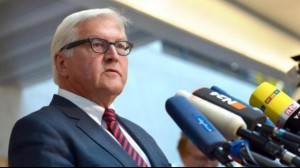 (Reuters) - Iran can no longer "play for time" in nuclear negotiations with six world powers that resumed on Friday, Germany's top diplomat said, two months ahead of a deadline for a deal that would end economic sanctions on Tehran in exchange for curbing its atomic program.
(Reuters) - Iran can no longer "play for time" in nuclear negotiations with six world powers that resumed on Friday, Germany's top diplomat said, two months ahead of a deadline for a deal that would end economic sanctions on Tehran in exchange for curbing its atomic program.
"We are entering the crucial phase of the E3+3 (six powers) negotiations with Iran," German Foreign Minister Frank-Walter Steinmeier told reporters in New York.
"There is no more room for Iran to play for time," he said. "We are willing to offer Iran a fair deal. However, for that to happen, Iran will need to move on the core issues."
Western diplomats close to the talks have accused Iran of making unrealistic demands and an unwillingness to offer real compromises that could allay fears about its nuclear ambitions. Tehran has in turn accused Western powers of demanding curbs on its nuclear program that are unreasonable and excessive, maintaining that its goal is atomic energy, not atomic armaments.
Steinmeier is in New York to attend a special ministerial meeting of the United Nations Security Council on the crisis in Iraq that will be chaired by U.S. Secretary of State John Kerry.
Senior officials from Iran and six world powers - the United States, Britain, France,Germany, Russia and China - met earlier at U.N. headquarters on Friday. The meeting was hosted by European Union foreign policy chief Catherine Ashton.
The latest round of negotiations is expected to run at least until Sept. 26, diplomats say.
A senior U.S. official told reporters on Thursday that foreign ministers from the six powers might join the nuclear talks next week on the sidelines of the annual gathering of world leaders at the U.N. General Assembly.
Iranian and Western officials have said that a deal is unlikely to be reached during the talks in New York due to disagreements between the two sides on the acceptable size and scope of Iran's nuclear centrifuge program and other issues.
Western governments want Iran to have a centrifuge capacity in the low, single-digit thousands so that it would take Tehran a long time to use the machines to purify enough uranium to fuel an atomic weapon.
Tehran, which denies Western allegations it is seeking a nuclear weapons capability, has rejected demands that it significantly reduce the number of centrifuges to below the more than 19,000 it has installed, of which roughly half are operating. Instead, it has proposed keeping that number constant for several years.
The U.S. official, who spoke on condition of anonymity, suggested on Thursday that such proposals were unacceptable: "The status quo is not doable for any of us."
Iran's economy is suffering from crippling international sanctions imposed on it for refusing to halt uranium enrichment. Last November in Geneva, Iran and the six powers reached an interim agreement under which Tehran won some easing of sanctions in return for halting its most sensitive nuclear work.
But they failed to meet a July 20 target for a comprehensive agreement and set a new deadline of Nov. 24.
A report by the U.N. nuclear watchdog obtained by Reuters on Friday showed that Iran is taking further action to comply with the extended interim agreement.
The findings in a monthly update by the International Atomic Energy Agency - though no major surprise - may be seen as positive by the West.
By Reuters
The Iran Project is not responsible for the content of quoted articles.

 QR code
QR code